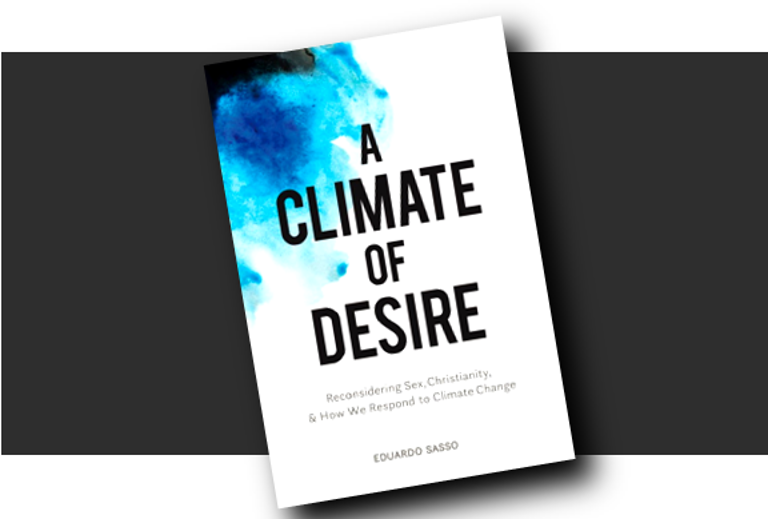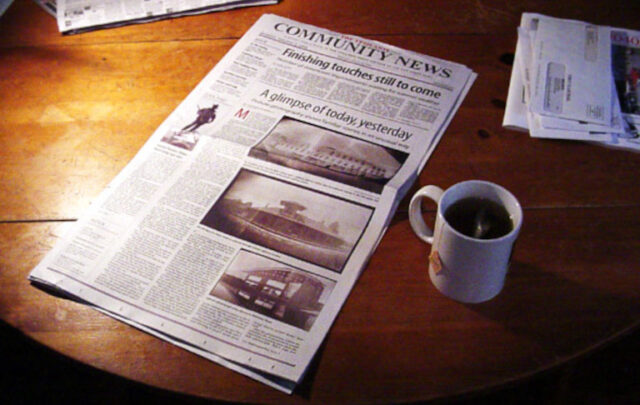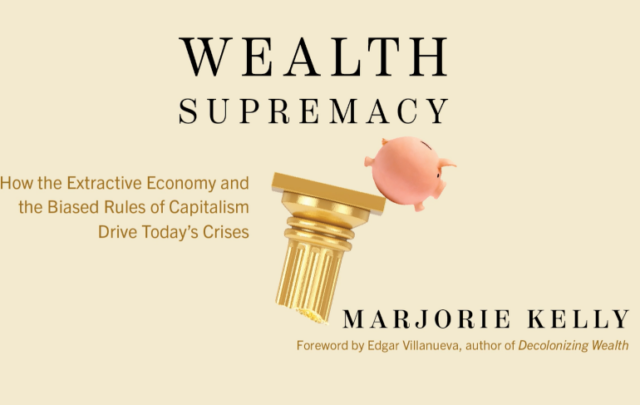Just around a year ago, business sustainability consultant and climate organizer Eduardo Sasso published A Climate of Desire ー a book reconsidering the original roots of Christianity to more fully enable us to respond to the challenges of climate change.
The table of contents of A Climate of Desire is presented below, followed by an excerpt from Chapter 1. The book can be found in printed and e-book version in several online stores here.
~~~
The Book’s Contents
Opening Words | 1
- Sex & the Cities | 12
A Tale of Five Voices
- “Just Gimme the Facts” | 28
Ecological Vital Signs in a Snapshot
- Babel, Babilonia, & California | 50
An Ancient Story, Remixed
- Climate Change & the Good News | 73
A Glimpse into the Ecological Vision of the Scriptures
- Giving to Caesar What is God’s? | 90
Exploring Faithful Political Engagements
- When the Climate Changed | 115
Hope for Today
- Becoming Earthkeepers | 130
A Call for All of Us
Afterword | 149
Annex: An Ongoing Experiment | 151
The Beginnings of a Concrete Response
~~~
Excerpt: Our Situation Today in Three Parables
Meet Boris Waterlove. Inspired by the young prophet Jeremiah and by the provocative visions of John the Seer, Boris Waterlove now takes center stage. The setting: a hot summer day at Boris’s house; the context: a visit from his friends, Jillian and Jack.
Tired as they were, Jillian and Jack asked for a glass of crisp, cold water. To his shock and surprise, Boris found a jar of pink rat poison next to the faucet. Being the noble and righteous man that he was, he immediately removed the container from the kitchen counter. Boris wanted to make sure that not a single, minuscule drop of poison fell into their glass. Allowing that to happen would obviously not be a loving action. Like any decent person, he wanted to serve clean, fresh water to his friends.
A few days after, Mr. Waterlove found out that the public water system was being polluted. (Willingly or unwillingly, consciously or unconsciously, he did not know.) Still, he wanted to be confident that the municipal waters were crisp and pure: Jillian and Jack would appreciate fresh water, as would he.
Seeing himself as a devout Christian, Boris was conflicted. He knew that he was called to love his friends as he loved himself. But . . . should he go beyond removing the pink rat poison jar from the counter?
“Environmentalism is such a ‘secular’ thing,” he had come to think. Regardless, the question lingered, “How can I have certainty that our municipal water is drinkable?”
Different possibilities stormed through his head. He could elect righteous officials to represent his interest in public office; he could participate in restoring the local watershed; he could even support a blue NGO, or perhaps he could even run for mayor (or for president). But . . . really? Giving his friends a glass of clear water sounded like a very holy thing to do, but the rest sounded . . . strange. Someone had taught him that Christianity was about loving people, not about government politics or environmental issues.
To his own surprise, Waterlove had a conversion experience. Coming into awareness that the God whom he pledged allegiance to was also the living source of all things, Boris came to see the wider connections. He realized that in protecting the watershed, he was also protecting his own friends. Waterlove became convinced that earthkeeping was a way of loving thousands of people at the same time. Letting justice and clean waters flow down like a river was a way of walking the walk.
“Maybe it’s true,” he thought to himself, “that ecologists are in the business of love and uncommon sense.”
~
Enter The Doublelives. Jillian and Jack Doublelife, however, were not as excited. In fact, they were secretly upset with Boris’s newfound enthusiasm. Both Jillian and Jack happened to be children of majority shareholders in a transnational oil and gas company. The corporation sold what is popularly known as bitumen (crude oil mixed with dirt and sand) and liquefied natural gas (an exotic form of fossil fuel captured by penetrating and fracturing the intricate layers of the earth’s crust).
To Boris’s ignorance, the extraction of bitumen and fracked gas (or, to use the politically polite term, “LNG”) required voluminous amounts of water: water to crack layers of underground rock, water to pump the gas all the way up to the surface. In turn, building oil and gas pipelines also threatened hundreds of rivers, lakes, beaches, and oceans.
The Doublelives were vaguely aware of the ill effects that pipelines, bitumen, and fracking had on local waterways. Still, they managed to ease their consciences with a rather clever charitable trick. While making a profit by serving an energy-hungry economy with one hand, the Doublelives donated 10 percent of their income to water-cleansing and water-bottling charities with the other—a sort of philanthropic yin-yang. (The trick came in handy, now that their friend Waterlove had become a nut-head of sorts, preaching what they perceived to be a liberal green gospel.)
Boris felt rather helpless. Not that Jillian and Jack had bad intentions, though; not that they were greedy, or careless. In fact, they were nice, decent people. But they were born into a dominant system governed by what had become the standard business norm: the unspoken but ever-present imperative to sacrifice the Earth at the lofty altar of Mr. Profit.
The imperative was rather capricious. It required comfortably living off of chopping down nature’s trunk instead of living gratefully off the fruit of her branches. The imperative meant extracting and consuming today at the expense of those coming tomorrow. It made everyone think that the world belongs to a few human beings. It called for the endless “penetration” of new markets (sexual pun unavoidably intended). The imperative made it imperative always to obey imperatives because almost everyone else was doing so.
The Doublelives were hard-pressed, indeed, by lots of imposed obligations. Hard-pressed because they didn’t choose their last name, after all. It was forged and bestowed on them by a society that bowed down to glittering gods that have eyes that cannot see and ears that cannot hear. Outside of meeting Boris and his new set of green convictions, the Doublelives knew no better.
But, by sheer grace, the Floating Clowns did.
~
The Floating Clowns. The Floating Clowns knew that watersheds were being penetrated and fracked up even as the atmosphere was changing. They knew about Boris’s new enthusiasm and helplessness, and about the Doublelives’ immersion in the imperative system. They knew the hard facts. They saw it coming.
But they managed to break the spell. They managed to put the all-pervasive megaphones on mute, and dance instead to the invisible music of an eternal tune. Enchanted, they overcame the odds. With the big pearl in their hands, they lacked nothing. Like King David or the eccentric Francis of Assisi, they ran around and danced naked, except for their boxer shorts.
And they laughed about it. Not with shallow, heartless laughter, though. Not with cynicism or self-indulgence. Not like tipsy ostriches digging their heads into the shaky sands of entertainment. They laughed with a joy that goes as deep as it gets.
A strange wind had cleared the glittering fog, enabling them to imagine and breathe in alternative possibilities. The Floating Clowns were not bogged down by the heavy clouds of trends and stats, but rose above them like hot-air balloons instead.
And by living simply, having nothing and yet possessing all things, the Clowns became the world’s laughing stock. Unlike the businessman who was so preoccupied accounting for all the stars, believing they were all his, the Clowns practiced an art forgotten by many. They smiled. They sang. They bent their heads backward taking in the wonder of the endless skies. They were filled with eternal bliss despite considering all the facts. Like Chesterton’s angels, the Floating Clowns could fly feet-on-the-ground because they took themselves lightly.
~
A Climate of Desire: Reconsidering Sex, Christianity, and How We Respond to Climate Change can be found in different online stores here.





